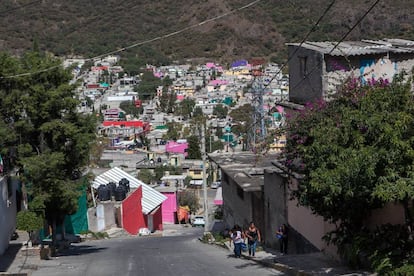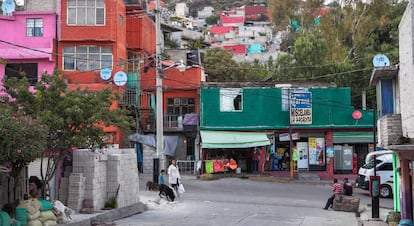The daily struggle for life in Ecatepec, Mexico’s most dangerous city
At least 600 women have been murdered since 2012 in this slum, half-an-hour from capital


Four women cross themselves before setting off up the steep hill into what has been described as the most dangerous place to live in Mexico. Much of Los Bordos, a slum in Ecatepec, about half-an-hour from the capital, Mexico City, has no running water or electricity, few schools, and fewer hospitals, and most worryingly for the four friends, no police. More than 600 women have been murdered here since 2012.
“Everybody who lives in Los Bordos knows how dangerous it is,” says one of the women, 46-year-old Eva Díaz, who has lived here for 20 years and has two sons. “Be careful,” she adds, because just a few hours ago on this hill a woman was held up at gunpoint and robbed.
Ecatepec lacks police officers: gangs control Los Bordos, using young boys to act as lookouts
With a population of more than 1.5 million, Ecatepec is the second-most-populated city in Mexico State, which rings the north and west of Mexico City, and tops government tables for murder, kidnapping, mugging and carjacking. The local police say that they deal with around one female murder victim a day.
Ecatepec’s mayor, Indalecio Ríos, admits that the city has a problem. “It all began back in the 1980s, when the place began to fill up with people from other areas who were looking for work in the capital. The population soon doubled, and Ecatepec was not ready for it. People began building homes on the hillsides of what is now Los Bordos before there were any services there. This created the marginalization and the violence that we are living through today,” he says.
The slum of Los Bordos, with its pastel-colored homes sprawling across the hillsides, can be seen clearly from Ecatepec’s two main avenues. The murder rate in Los Bordos has risen dramatically in the last 10 years: from 198 in 2006, to 516 in 2015, higher than those in the states of Chiapas, Colima, Durango, Morelos, or Coahuila. Iztapalapa, one of the toughest districts of Mexico City, which has a similar population, recorded a relatively modest 198 homicides last year.
Many of Ecatepec’s youngsters do not bother attending school, and can be seen hanging on street corners during the day while their parents are at work. Local criminals use them to sell drugs or to commit murders, knowing that if they are caught they cannot be sent to prison.

A recently installed cable car now runs up and down the hillside, making the journey in to Mexico City, which takes two hours, a little safer than using the communal microbus taxis that operate here. “I don’t know of anybody who has not been robbed in a microbus,” says 64-year-old Petra Cedillo.
“Mexico has a crime problem and Ecatepec hasn’t escaped it. Our challenge is to solve it, but we lack the resources,” says the mayor. What Los Bordos lacks are police officers: gangs control the hillsides, using young boys to act as lookouts in the streets below. The absence of any law and order has led local people to sometimes take matters into their own hands: a banner hangs across one of the main streets that reads: “Stop! If we catch you stealing we’ll lynch you.”
Halfway up the hill, the four women take shelter from the sun under a tree. They must be home before 9pm, they say, because after dark, the streets of Ecatepec are even more dangerous. “If you are cornered by a thief, pray to God that he only steals your purse,” says Eva Díaz.
English version by Nick Lyne.
Tu suscripción se está usando en otro dispositivo
¿Quieres añadir otro usuario a tu suscripción?
Si continúas leyendo en este dispositivo, no se podrá leer en el otro.
FlechaTu suscripción se está usando en otro dispositivo y solo puedes acceder a EL PAÍS desde un dispositivo a la vez.
Si quieres compartir tu cuenta, cambia tu suscripción a la modalidad Premium, así podrás añadir otro usuario. Cada uno accederá con su propia cuenta de email, lo que os permitirá personalizar vuestra experiencia en EL PAÍS.
¿Tienes una suscripción de empresa? Accede aquí para contratar más cuentas.
En el caso de no saber quién está usando tu cuenta, te recomendamos cambiar tu contraseña aquí.
Si decides continuar compartiendo tu cuenta, este mensaje se mostrará en tu dispositivo y en el de la otra persona que está usando tu cuenta de forma indefinida, afectando a tu experiencia de lectura. Puedes consultar aquí los términos y condiciones de la suscripción digital.








































